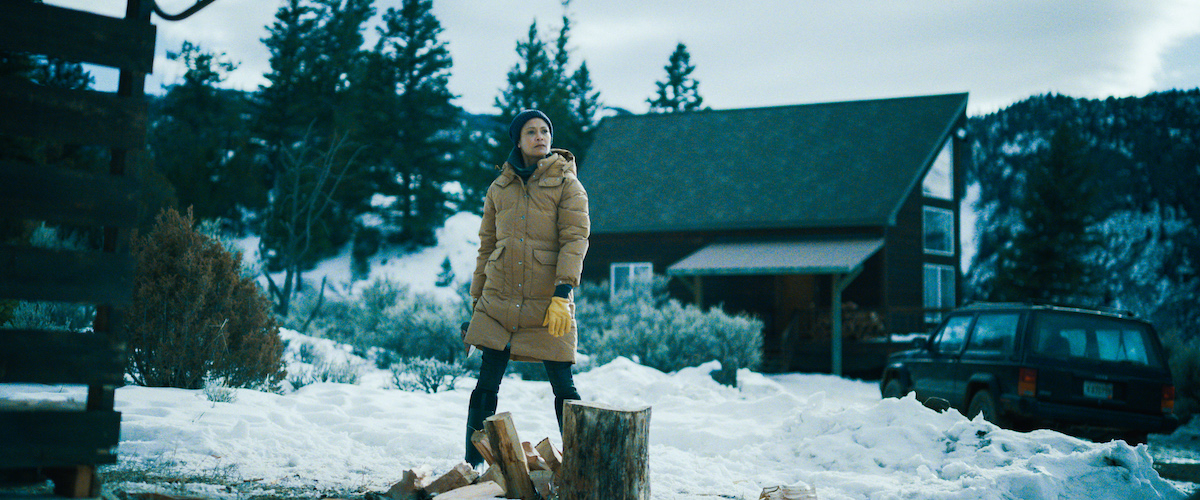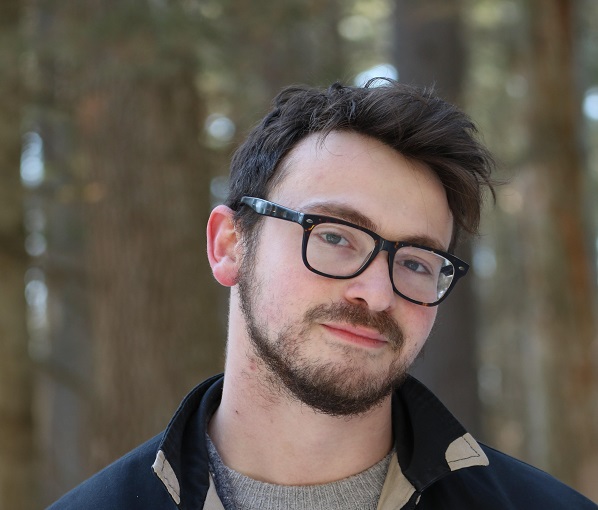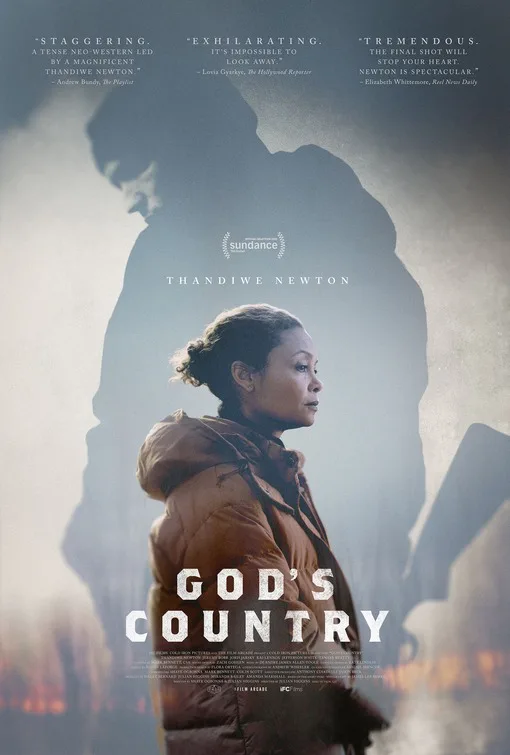Western Montana is a wild place, full of beauty and desolation, though “God’s Country” dwells more upon the latter. In its forlorn depiction of this vast, mountainous sweep, the ground is frozen and hard, and the people who live there are much the same.
Early in Julian Higgins’ profound and haunting feature debut, out Friday, university professor Sandra (Thandiwe Newton) watches as a pine box disappears into a crematorium’s waiting furnace. Her face is worn, etched with regret. With a pickaxe, she buries the ashes near her home in a snow-capped canyon. Nearly eight minutes pass before we hear Sandra speak. It takes longer to learn that the recently-deceased was her ailing mother, and “God’s Country” has half-elapsed before the reason both mother and daughter first came to these barren plains is illuminated.
After returning home, Sandra spots a red pick-up truck parked on her property. She leaves a note behind the windshield, warning the trespassers to go elsewhere. Instead, the next day, they return. Sandra finds the note crumpled in the snow, next to the bloodied carcass of a bird. Confronted, the pair—Nathan (Joris Jarsky) and Samuel (Jefferson White, of “Yellowstone”)—claim not to have seen Sandra’s note but explain that her property provides the best jumping-off points for hunting in the surrounding forest.
They’re not asking. Fatefully, neither is she. Sandra tows their truck; the next morning, she finds an arrow shot into her front door. And so escalates an ominous battle of wills between Sandra and the hunters, one that threatens at any moment to erupt into the spectacle of violence that’s long been as mythically linked to the American West as colonial concepts of frontier justice and manifest destiny.
But it doesn’t, at least not at first. Higgins and cinematographer Andrew Wheeler sustain a mood of charged stillness that imbues their stark images—a cigarette smoldering in snow, a dilapidated house in the middle of nowhere—with elemental weight and poetry, inviting us to contemplate the power struggle at the film’s center as something more existential than a dispute over territory.
In one evocation of “Winter Light,” the James Lee Burke short story from which “God’s Country” is drawn, long shots are framed to emphasize Sandra’s smallness against, and isolation within, the many structures—houses, churches, landscapes—that dwarf her. In another, sacred ground affords Sandra and Nathan the time and space to uncover a connection that’s quietly linked them their whole lives. She asks him, and herself, “Are you just what happened to you?”
Higgins previously adapted “Winter Light” as a short film. In reapproaching it as a feature, he and co-writer Shaye Ogbonna changed the protagonist from a white man in his sixties to a Black woman in her forties, a decision that greatly stimulates the narrative’s sociopolitical subtext while expanding its scope.
No longer simply about one man’s moral struggle to resist the violence embedded within him, “God’s Country” still explores cycles of masculine aggression, particularly in a tense sequence where the acting sheriff (Jeremy Bobb) intervenes in the feud. The near-calamitous results of this attempt at de-escalation also reveal the hatred many locals—both white and Indigenous—reserve for law enforcement and identify another failed institution Sandra cannot count on.
But “God’s Country” is just as deft at depicting the accumulated burden of Sandra’s experiences as a Black woman determined to carve out a space for herself in this rural, unsettled part of the country, and as such unwilling to cede even an inch of ground in her interactions with the locals. Nathan, whom she encounters first, eventually responds to this resilience with a begrudging admiration, albeit one that we glean later has been tainted by his upbringing. More terrifying is Samuel, played by White with a gaunt and wolfish hunger that could be more than an intimidation tactic. When Sandra follows him home and asks, “Why are you like this?” in an effort to gain the upper hand, the dark look in his eyes forces her to beat a hasty retreat.
The film also captures the toll of Sandra’s exposure to other threats and forms of racial animus and gender-based violence that pollute the air constantly, including at her university, where the department head (Kai Lennox) only considers inclusivity to a point, and a revelation involving a student she’s nurtured (Tanaya Beatty) brings Sandra to a breaking point.
At every turn magnifying the dramatic power of this story is Newton, an actress of exceptional grit and grace who’s capable of communicating more emotion in a single, simmering look than many pages of dialogue could exposit. (Indeed, Newton’s central role on HBO’s “Westworld” often seems devised to showcase this.) She’s in every scene of “God’s Country” and rises to the occasion with a performance of ferocious strength and vulnerability, the greatest of her career. Though the film’s mood of solemn restraint characterizes her work as well, Newton lays bare Sandra’s inner struggle between lived defiance and learned despair as the fight of her life.
And so the progression of her character’s bone-deep weariness—the hardening of her anger, strength, and convictions into a cold, annihilative rage that drives the film to its conclusion—has about it the inevitability of a gathering storm, a reckoning, and a tragedy. “Sometimes it feels like things never change,” Sandra tells her students. “But I promise you they do. They have to.”
As “God’s Country” reaches its darkly exhilarating final shot, we’re left to question what sacrifices will be required to break the cycles of violence and systemic oppression that have informed so much of America’s history, society, and self-knowledge. It’s a question asked in another way by the film’s very first scene, which takes place in a darkened classroom, as a slide projector casts image after image of American conquest against a screen—a rack of bison pelts, two white men looming above a Native tribesman, a Black woman with one eye bruised—for no one but us, now, to see more clearly.
“God’s Country” is in theaters Sept. 16.




















